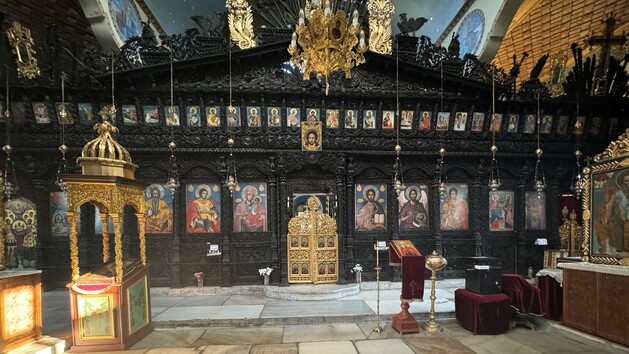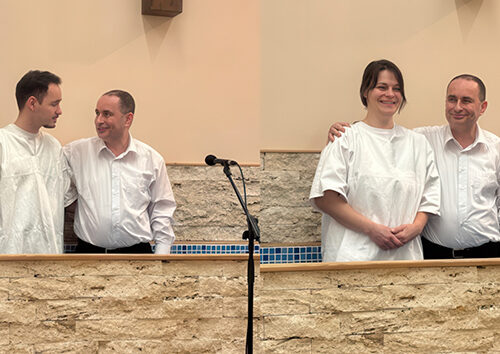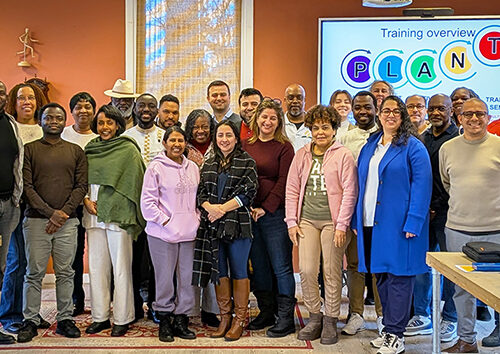28 November 2024 | Plovdiv, Bulgaria [Adriana Fodor with tedNEWS]
Adriana Fodor is a pastor who serves in the Welsh Mission, British Union Conference. A participant at the Adventist Mission in Orthodox Cultures Conference which recently took place in Plovdiv, Bulgaria, Fodor shares her perspective with tedNEWS on the transition she made from an Orthodox upbringing to serving as an Adventist pastor, with a continuing deep respect for her cultural and religious background.
I am originally from Romania and along with my whole family, I come from an Orthodox background. I grew up with my grandparents from the age of 6 months to the age of 7 years old and of course influenced my thinking and worldview from an early age. I very much appreciated the loving and caring family environment they provided for me while living with them. Regularly I would be taken to church and would be taught how to pray to my guardian angel.
My Orthodox Upbringing
I never read the Bible and, consequently, had very little understanding of who God was. Nor did I know who Jesus was. My only knowledge of the gospel story was that we would watch the ‘Jesus of Nazareth’ movie every year at Easter to see who Jesus is and why He is so important. I was never even told why we had Orthodox beliefs; it was as if we were expected to simply absorb them into our lives.
The inside of an Orthodox church is filled with paintings and images on the walls. The smell of incense creates the impression that you are in a holy, special place. I suppose it can be described as multi-sensory worship. The priest would sing alone, without the congregation, and I never knew what he was singing about! The congregation would pack into the church, all standing for an hour-long service without chairs. There were some on the side, but I understand these were only for wealthy people who paid for the privilege of being seated.
Growing up Orthodox, I didn’t know God. I heard of Him, but nobody explained anything about Him. What I did know was very much based on customs, practices, and traditions. The only real supernatural connection I had was with my guardian angel who was there looking out for me.
On a school trip one day when I was about 9 or 10 years old, the teacher took us to an Orthodox church to meet the priest at the front of the church. We kneeled before the priest and confessed our sins, and I can say how uncomfortable I felt about this.

Trauma and the Need to Escape
Between the ages of 10 and 14, I experienced many unpleasant situations at home. My parents were not religious and would often argue with each other, which impacted me greatly in a negative way to the point where I felt I just couldn’t cope with the situation. I looked for a way out, a way to escape from this horrible situation. With my father addicted to alcohol, my mother would sometimes blame me for allowing my dad to sell things from the house to pay for his addiction to buy alcohol. My parents were not religious
When I was 14, my mother decided to divorce my father. I saw three ways to escape the pain. I could either run away from home, become a nun, or stop existing.
Not long after I was wondering which direction to take, my mother took my brother and me to live with my maternal grandmother, who was an Adventist. I had never heard of the Adventist church before because I had little to do with my grandmother. But once settled in, she started taking me to church every Sabbath.
I attended the Adventist church with my grandma for about a year, and I was baptised at the age of 15. That was the very first time I was invited to read the Bible, the first time I learned about Jesus, the need for salvation, the meaning of the Sabbath, and the future hope of Christ’s return. As I learned about who Jesus was, it was as if He was filling the pain and the need to escape from the empty hole in my life. For the first time, I was learning about the God in heaven who loves me and cares for me, which I had never imagined in an Orthodox community.
Becoming an Adventist gave me a sense of belonging, but I also need to say that at the time, I was experiencing a very dark period in my life—a personal sense of hell because of the struggles at home with my parents, where I didn’t feel loved or cared for.
Reading the Bible opened my eyes to the reality of God—who loves and cares for me. From those moments, I began to develop a relationship with Him and feel I might have a future ahead of me. My view of life changed how I saw myself, and I had hope again. Indeed, having a new friendship with God completely changed my life, and I could no longer see the future without Him.

The parents of my father became distressed and upset about my conversion to Adventism. They felt I had betrayed them and, of course, blamed my maternal grandmother, as did the wider family, who simply could not understand the choice I was making. They felt I had been brainwashed, and with my lifestyle changes, they were deeply unhappy.
The 6 January Challenge
Shortly after being baptised, it was 6 January. In the Orthodox calendar, 6 January is a significant day, remembering when Jesus was baptised by John the Baptist. The priest must go from house to house to give a blessing, to both the house and the family, with holy water.
All in the house would wait expectantly for him to arrive. He would sing as he approached the house, with everyone responding by kissing the cross as he blessed each family member. My grandparents, my brother, and I were all waiting for the priest to bless us with the holy water on the head. However, when the priest approached me, I shook my head to indicate that I did not want to take part in the ritual. He gave me a distressed look, and as you can imagine, the priest spoke with my family and wanted to know why I refused. They believed that I had ‘turned to the other side.’
On reflection, I know that my decision caused shame and embarrassment to the family. They were not happy at all. After a few years, they learned to accept my decision and the lifestyle choices I had made.
The Desire to Learn More
During my conversion experience, I was like a sponge absorbing water. I was excited about discovering the truths scripture had to share, so I decided to study theology and experienced the call to ministry. To this day, I continue to be excited about learning who God is and how He is relevant to our lives today. Knowing Jesus means I have a friend with whom I can share my personal experiences, both the joys and the pain, and, in return, experience His presence and comfort.
[Featured image: David Neal. Family picture, courtesy of Adriana Fodor]



